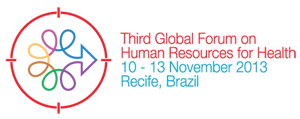Galvanizing Commitment to Universal Health Coverage – Results from the 3rd Global Forum on Human Resources for Health (HRH)

It isn’t often that one gets two conferences in one; but the well-attended pre-conference side sessions at the Third Global Forum on HRH held in Recife, Brazil provided such an opportunity. The topic of particular interest to me was how support for community health workers (CHWs) and primary health care (PHC) systems could be better coordinated to achieve the Millennium Development Goals, scale up access to PHC and finally move toward Universal Health Coverage (UHC). The session, attended by many countries and diverse donors, partners and NGOs, institutes and CHWs provided a global opportunity to analyze the meaning and impact of collaboration.
Growing awareness that lack of harmony in approaches by donors, research institutes, international NGOs and private corporations causes fragmentation, duplication and service gaps have made the development community reconsider how to provide support and optimize the contribution of CHWs1. Most disturbing is that many countries still undervalue this community-focused cadre and have yet to integrate CHWs into the national health system.
So in preparation for Recife, the Global Health Workforce Alliance commissioned three papers that laid out a plan for one national strategy, one lead national authority and one monitoring and accountability platform. This synchronization will hopefully foster partner harmonization and needs-based global research, bringing us closer to UHC. The audience had little disagreement with the concept, but the discussion was punctuated with comments on how and by whom this would be implemented. The final outcome is a CHW Framework for Partner Action and signed commitments to adhere to the following broad principles:
Work together to adapt, apply and implement the Framework, fostering harmonization and synergies, accountability and joint action on knowledge gaps and reaching out to all stakeholders engaged with CHW programs
Advocate, endorse and apply the Framework’s principles and processes
Promote the culture of self and mutual monitoring and accountability of commitments and plans
Reciprocally respond to knowledge gaps and promote a coordinated response to needs-based research on CHWs.
The Road Forward – An Interview with Diana Frymus, Office of HIV/AIDS, USAID
CHW Central: What steps will be taken to move the agenda into action?
Diana Frymus: We are currently working on developing a final report from the CHW side session that was held at the 3rd Global HRH Forum. The report will lay out potential options for moving this effort forward, such as 1) mechanisms which country stakeholders can utilize to develop strategies around the framework for harmonization, 2) increasing communication with national and global level actors to gain more support and attention to this issue, and 3) taking advantage of upcoming global events that will be held in 2014. When finalized, the report will be circulated widely for feedback and be used to decide key next steps in how to move the agenda forward.
CHW Central: How will we know whether the strategy is working?
Diana Frymus: The proposed monitoring and accountability framework was developed for this purpose. Continued discussion is needed for how it can be operationalized. Key indications of whether this strategy is working will include noticeable country level commitment to integrating CHW programs within national health systems and when CHWs are more routinely part of the dialogue in country health workforce agendas. This will require greater coordination and collaboration of CHW stakeholders.
CHW Central: What are the expectations for the future of this Framework?
Diana Frymus: We expect the framework to help support CHWs’ full contribution to accelerating MDGs and achieving UHC. We currently operate in a very fragmented landscape for CHW programs which inhibits this from happening. Greater alignment across efforts for CHW programs is needed. We hope that the framework can serve as a universal platform for achieving respective health development goals.
Diana Frymus is a Health Systems Strengthening Advisor in the Office of HIV/AIDS at USAID. She was involved in the organization of the CHW Side Session at the 3rd Global HRH Forum that was used as a platform for discussion of the CHW Framework for Partner Action and in authoring the Global Health Workforce Alliance commissioned paper on identification of knowledge gaps and defining a global research agenda.
Donna Bjerregaard, Initiatives Inc. is the author of this blog and manager of CHW Central.
Organizations wishing to submit their note of commitment to this Framework should send it to: Dr. Muhammad Mahmood Afzal, Global Health Workforce Alliance: afzalm@who.int
1 The term CHW represents frontline health workers and similar cadre
Learn more here
This is a repost from CHW Central and an Interview with Diana Frymus, Office of HIV/AIDS, USAID by Donna Bjerregaard, Initiatives Inc. and CHW Central.
CHW Central is a global resource for and about Community Health Workers.
Read more about CHW Central at: http://www.chwcentral.org/

Comments are closed